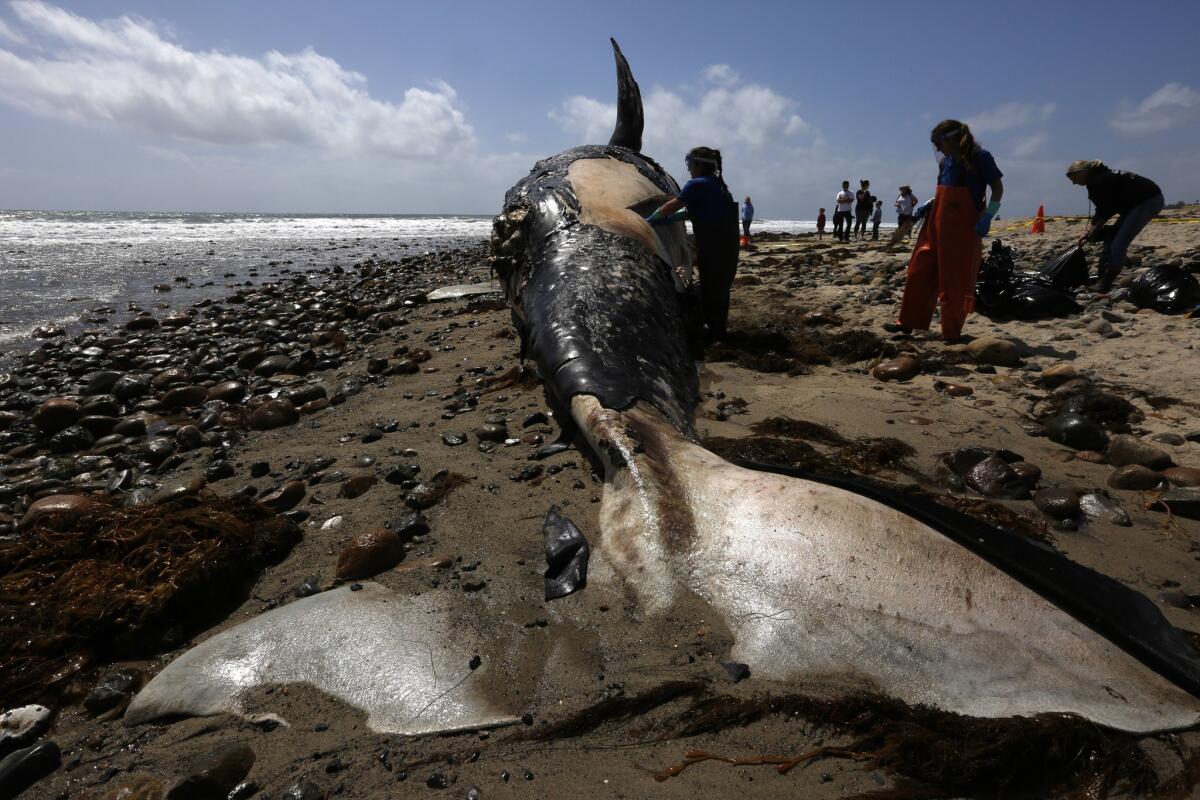Decomposing whale carcass threatens to draw sharks to Trestles surfing area

A research biologist with NOAA takes samples from a dead whale that washed up in Orange County near Lower Trestles along San Onofre State Beach.
A massive dead whale has washed ashore at Trestles, a popular surfing destination near the Orange County-San Diego County line, and triggered safety concerns that its carcass could attract sharks.
Swimmers and surfers were asked to stay away from Lower Trestles, a surfing destination at San Onofre State Beach, as the gray whale decomposes, said Capt. Todd Mansur, a lead naturalist at Dana Wharf Sportfishing and Whale Watching.
Meanwhile, state lifeguards planned to use boats to move the whale carcass from the shoreline at high tide, he said. The carcass will be guided into the ocean and hauled at least 10 miles away from shore.
Mansur, a Gray Whale Foundation board member, first spotted the roughly 40-foot whale offshore Friday afternoon.

A dead whale is drawing huge crowds to a San Clemente beach and tons of interest on social media.
The 50,000-pound whale reemerged Sunday morning when it washed up on the beach. The whale appeared to be decomposing “very rapidly,” he said.
By Monday, a team from the National Oceanic and Atmospheric Administration Fisheries was headed to the beach to perform a necropsy on the bloated whale, officials said.
“This whale is floating like a balloon,” Mansur said.
Mansur examined the adult male, which was lying left side up, and believes he died of natural causes. There were no visible lacerations, and no indications the whale had been struck by a ship.
“It was a clean-looking whale,” he said. “This whale was so fresh that the sharks hadn’t found it yet.”
See more of our top stories on Facebook >>
Mansur said some beachgoers have reported seeing sharks in the water, but the sightings have not been confirmed.
And as if one whale weren’t enough, the carcass of a second gray whale was also seen floating off T-Street Beach near San Clemente Pier, Mansur said.
Unlike the first whale, the second carcass appeared to be fully decomposed.
All that remained of the whale was its skin, he said.
Mansur said it was “extremely unusual” to see two dead whales this time of year. Mansur, a certified marine naturalist, said he typically sees one dead whale per year.
Although these two sightings were rare, Mansur believes the deaths were a coincidence.
“We know and expect to get dead animals,” he said. “It’s just nature.”
State lifeguards also planned to move the mass of flesh away from the shore before high winds sweep over the ocean water.
Up to 37 mph winds were expected along the coast Monday.
Gale-force winds could hamper efforts to remove the carcass, Mansur said.
Burying the whales in the sandy beach is not an option, he said.
A buried carcass decomposes and releases oil, and attracts sharks from several miles away, he said. A buried whale carcass takes years to decompose.
The sight of a decomposing whale drew professional surfer Kelly Slater to the beach Sunday.
“Im sure that #BeachedWhale oil should keep the crowds to a minimum coming into summer! Sketchy,” Slater wrote on Instagram. “Great white sightings sure seemed to coincide with the burying of a whale 15+ years back by Trails.”
Surfer Kalani Robb shot a short video showing a small crowd of beachgoers gazing at the beached whale.
“Guess I won’t be surfing lowers right now #deadwhale,” he wrote on Instagram.
For breaking news in California, follow VeronicaRochaLA on Twitter.
ALSO
Couple tried to call 911 twice after dog mauled newborn baby
Coroner postpones ruling in cause of death of wrestling star Chyna
Body found floating in Echo Park Lake over the weekend
More to Read
Sign up for Essential California
The most important California stories and recommendations in your inbox every morning.
You may occasionally receive promotional content from the Los Angeles Times.










